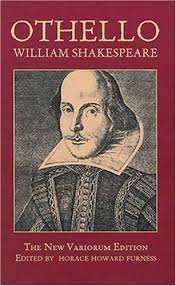Othello
Othello is a tragedy by William Shakespeare, believed to have been written in 1603. It is based on the story Un Capitano Moro by Cinthio, a disciple of Boccaccio, first published in 1565.
Actus Primus. Scoena Prima. Enter Rodorigo, and Iago. Rodorigo. Neuer tell me, I take it much vnkindly That thou (Iago) who hast had my purse, As if y strings were thine, should'st know of this Ia. But you'l not heare me. If euer I did dream Of such a matter, abhorre me Rodo. Thou told'st me, Thou did'st hold him in thy hate Iago. Despise me If I do not. Three Great-ones of the Cittie, (In personall suite to make me his Lieutenant) Off-capt to him: and by the faith of man I know my price, I am worth no worsse a place. But he (as louing his owne pride, and purposes) Euades them, with a bumbast Circumstance, Horribly stufft with Epithites of warre, Non-suites my Mediators. For certes, saies he, I haue already chose my Officer. And what was he? For-sooth, a great Arithmatician, One Michaell Cassio, a Florentine, (A Fellow almost damn'd in a faire Wife) That neuer set a Squadron in the Field, Nor the deuision of a Battaile knowes More then a Spinster. Vnlesse the Bookish Theoricke: Wherein the Tongued Consuls can propose As Masterly as he. Meere pratle (without practise) Is all his Souldiership. But he (Sir) had th' election; And I (of whom his eies had seene the proofe At Rhodes, at Ciprus, and on others grounds Christen'd, and Heathen) must be be-leed, and calm'd By Debitor, and Creditor. This Counter-caster, He (in good time) must his Lieutenant be, And I (blesse the marke) his Mooreships Auntient Rod. By heauen, I rather would haue bin his hangman Iago. Why, there's no remedie. 'Tis the cursse of Seruice; Preferment goes by Letter, and affection, And not by old gradation, where each second Stood Heire to'th' first. Now Sir, be iudge your selfe, Whether I in any iust terme am Affin'd To loue the Moore? Rod. I would not follow him then Iago. O Sir content you. I follow him, to serue my turne vpon him. We cannot all be Masters, nor all Masters Cannot be truely follow'd. You shall marke Many a dutious and knee-crooking knaue; That (doting on his owne obsequious bondage) Weares out his time, much like his Masters Asse, For naught but Prouender, & when he's old Casheer'd. Whip me such honest knaues. Others there are Who trym'd in Formes, and visages of Dutie, Keepe yet their hearts attending on themselues, And throwing but showes of Seruice on their Lords Doe well thriue by them. And when they haue lin'd their Coates Doe themselues Homage. These Fellowes haue some soule, And such a one do I professe my selfe. For (Sir) It is as sure as you are Rodorigo, Were I the Moore, I would not be Iago: In following him, I follow but my selfe. Heauen is my Iudge, not I for loue and dutie, But seeming so, for my peculiar end: For when my outward Action doth demonstrate The natiue act, and figure of my heart In Complement externe, 'tis not long after But I will weare my heart vpon my sleeue For Dawes to pecke at; I am not what I am Rod. What a fall Fortune do's the Thicks-lips owe If he can carry't thus? Iago. Call vp her Father: Rowse him, make after him, poyson his delight, Proclaime him in the Streets. Incense her kinsmen, And though he in a fertile Clymate dwell, Plague him with Flies: though that his Ioy be Ioy, Yet throw such chances of vexation on't, As it may loose some colour Rodo. Heere is her Fathers house, Ile call aloud Iago. Doe, with like timerous accent, and dire yell, As when (by Night and Negligence) the Fire Is spied in populus Citties Rodo. What hoa: Brabantio, Signior Brabantio, hoa Iago. Awake: what hoa, Brabantio: Theeues, Theeues. Looke to your house, your daughter, and your Bags, Theeues, Theeues Bra. Aboue. What is the reason of this terrible Summons? What is the matter there? Rodo. Signior is all your Familie within? Iago. Are your Doores lock'd? Bra. Why? Wherefore ask you this? Iago. Sir, y'are rob'd, for shame put on your Gowne, Your heart is burst, you haue lost halfe your soule Euen now, now, very now, an old blacke Ram Is tupping your white Ewe. Arise, arise, Awake the snorting Cittizens with the Bell, Or else the deuill will make a Grand-sire of you. Arise I say Bra. What, haue you lost your wits? Rod. Most reuerend Signior, do you know my voice? Bra. Not I: what are you? Rod. My name is Rodorigo Bra. The worsser welcome: I haue charg'd thee not to haunt about my doores: In honest plainenesse thou hast heard me say, My Daughter is not for thee. And now in madnesse (Being full of Supper, and distempring draughtes) Vpon malitious knauerie, dost thou come To start my quiet Rod. Sir, Sir, Sir Bra. But thou must needs be sure, My spirits and my place haue in their power To make this bitter to thee Rodo. Patience good Sir Bra. What tell'st thou me of Robbing? This is Venice: my house is not a Grange Rodo. Most graue Brabantio, In simple and pure soule, I come to you Ia. Sir: you are one of those that will not serue God, if the deuill bid you. Because we come to do you seruice, and you thinke we are Ruffians, you'le haue your Daughter couer'd with a Barbary horse, you'le haue your Nephewes neigh to you, you'le haue Coursers for Cozens: and Gennets for Germaines Bra. What prophane wretch art thou? Ia. I am one Sir, that comes to tell you, your Daughter and the Moore, are making the Beast with two backs Bra. Thou art a Villaine Iago. You are a Senator Bra. This thou shalt answere. I know thee Rodorigo Rod. Sir, I will answere any thing. But I beseech you If't be your pleasure, and most wise consent, (As partly I find it is) that your faire Daughter, At this odde Euen and dull watch o'th' night Transported with no worse nor better guard, But with a knaue of common hire, a Gundelier, To the grosse claspes of a Lasciuious Moore: If this be knowne to you, and your Allowance, We then haue done you bold, and saucie wrongs. But if you know not this, my Manners tell me, We haue your wrong rebuke. Do not beleeue That from the sence of all Ciuilitie, I thus would play and trifle with your Reuerence. Your Daughter (if you haue not giuen her leaue) I say againe, hath made a grosse reuolt, Tying her Dutie, Beautie, Wit, and Fortunes In an extrauagant, and wheeling Stranger, Of here, and euery where: straight satisfie your selfe. If she be in her Chamber, or your house, Let loose on me the Iustice of the State For thus deluding you Bra. Strike on the Tinder, hoa: Giue me a Taper: call vp all my people, This Accident is not vnlike my dreame, Beleefe of it oppresses me alreadie. Light, I say, light. Enter. Iag. Farewell: for I must leaue you. It seemes not meete, nor wholesome to my place To be producted, (as if I stay, I shall,) Against the Moore. For I do know the State, (How euer this may gall him with some checke) Cannot with safetie cast-him. For he's embark'd With such loud reason to the Cyprus Warres, (Which euen now stands in Act) that for their soules Another of his Fadome, they haue none, To lead their Businesse. In which regard, Though I do hate him as I do hell paines, Yet, for necessitie of present life, I must show out a Flag, and signe of Loue, (Which is indeed but signe) that you shal surely find him Lead to the Sagitary the raised Search: And there will I be with him. So farewell.
Translation
Translate and read this book in other languages:
Select another language:
- - Select -
- 简体中文 (Chinese - Simplified)
- 繁體中文 (Chinese - Traditional)
- Español (Spanish)
- Esperanto (Esperanto)
- 日本語 (Japanese)
- Português (Portuguese)
- Deutsch (German)
- العربية (Arabic)
- Français (French)
- Русский (Russian)
- ಕನ್ನಡ (Kannada)
- 한국어 (Korean)
- עברית (Hebrew)
- Gaeilge (Irish)
- Українська (Ukrainian)
- اردو (Urdu)
- Magyar (Hungarian)
- मानक हिन्दी (Hindi)
- Indonesia (Indonesian)
- Italiano (Italian)
- தமிழ் (Tamil)
- Türkçe (Turkish)
- తెలుగు (Telugu)
- ภาษาไทย (Thai)
- Tiếng Việt (Vietnamese)
- Čeština (Czech)
- Polski (Polish)
- Bahasa Indonesia (Indonesian)
- Românește (Romanian)
- Nederlands (Dutch)
- Ελληνικά (Greek)
- Latinum (Latin)
- Svenska (Swedish)
- Dansk (Danish)
- Suomi (Finnish)
- فارسی (Persian)
- ייִדיש (Yiddish)
- հայերեն (Armenian)
- Norsk (Norwegian)
- English (English)
Citation
Use the citation below to add this book to your bibliography:
Style:MLAChicagoAPA
"Othello Books." Literature.com. STANDS4 LLC, 2025. Web. 22 Feb. 2025. <https://www.literature.com/book/othello_14>.








Discuss this Othello book with the community:
Report Comment
We're doing our best to make sure our content is useful, accurate and safe.
If by any chance you spot an inappropriate comment while navigating through our website please use this form to let us know, and we'll take care of it shortly.
Attachment
You need to be logged in to favorite.
Log In